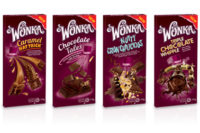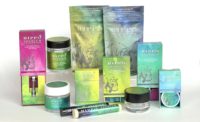Nestlé International Travel Retail (NITR) has announced the latest innovation for its Quality Street line. Following the introduction of recyclable FSC-certified paper packaging for its twist-wrapped sweets in October 2022, Quality Street has now revealed colorful new paper sharing packs, with global travel retail as the launch pad. The 750-gram packs, which launched in January, are clearly marked "I am paper."
NITR General Manager Stewart Dryburgh said: “This is big news, not just for Nestlé and Quality Street but for the confectionery category in general. It underlines NITR’s strong focus on sustainability and its commitment to reducing the use of virgin plastic, boosting recycling and supporting a circular economy. It is also a clear indication of our determination to meet the needs and demands of the increasing number of travelling consumers who are looking to purchase sustainable products."
“When Quality Street opted to move from dual foil and cellulose to recyclable paper packaging for its twist-wrapped sweets, it meant the removal of more than 2 billion pieces of packaging material from the brand's supply chain worldwide. At NITR we are convinced that this is the only way forward. And to have this pack as a travel retail-exclusive line is indicative of the importance that Nestlé as a company attaches to the channel.”
Quality Street and sustainability
Since it was first launched in 1936, Quality Street has been produced in Halifax, West Yorkshire, UK. It was a history-making brand from the start, using the world's first twist-wrapping machine to revolutionize the way chocolates were manufactured and sold.
While Quality Street has long been known for its bright and colorful packaging, the brand’s sustainability efforts are not so well known. Quality Street has been working to improve the sustainability of its operations and supply chain for well over a decade. In the Halifax factory there is zero waste to landfill. Quality Street has used only certified sustainably sourced cocoa since 2015, and Quality Street chocolate is made from milk sourced from farms in Scotland that have been part of a sustainable farming partnership with Nestlé since 2003.
“It’s a commendable story,” added Dryburgh. “Quality Street has always lived up to its name and is a steadfast brand within the NITR portfolio.”
Quality Street was the second Nestlé confectionery brand to introduce paper, following Smarties, which rolled out recyclable paper packaging for all its confectionery products globally in 2021. Both brands are expected to significantly impact Nestlé's aim to have 95% of its packaging designed for recycling by 2025 and its commitment to achieving 100%.
"Together We Grow"
Quality Street products will be a strong feature of NITR’s new channel exclusive ‘Together We Grow’ platform which aims to help its retailer partners accelerate sustainable programs. The concept falls under the Regeneration pillar of NITR’s VERSE model (Value, Engagement, Regeneration, Sense of Place and Execution) and, like the new chocolate line, is exclusive to travel retail.
NITR is confident that the platform can support its retail partners sustainability objectives in parallel to communicating the already significant environmental impact it has made through its packaging projects, the Cocoa Plan and Coffee Plan responsible sourcing initiatives over the last 15 years.
The Nestlé Cocoa Plan was launched in 2009 and has engaged more than 150,000 cocoa-farming families so far, building on three pillars:
- Better farming, aiming to improve livelihoods in communities
- Better lives, aiming to improve social conditions for families
- Better cocoa, aiming to improve product sustainability.
Since 2016 all the cocoa sourced for the Quality Street chocolate has been certified which means it is being grown more sustainably.
The brand collaborates with the Rainforest Alliance that goes beyond certification of cocoa beans into other impact areas. In fact, the Rainforest Alliance is not the only organization Quality Street is partnering with on its journey to make cocoa more sustainable. Other include International Cocoa Initiative, Fair Labor Association, KIT Royal Tropical Institute, Earthworm, and Jacobs Foundation.



